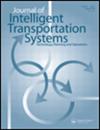Robust learning control for autonomous vehicle with network delays and disturbances
IF 2.8
3区 工程技术
Q3 TRANSPORTATION
Journal of Intelligent Transportation Systems
Pub Date : 2025-09-03
DOI:10.1080/15472450.2024.2329912
引用次数: 0
Abstract
This paper deals with a robust learning nonlinear model predictive control (RL-NMPC) scheme under time-varying delays and disturbances. It is well known that the in-vehicle network has considerable advantages over the traditional point-to-point communication. However, on the other hand, these technologies would also induce the probability of time-varying delays, which would be a hazard in the active safety of over-actuated autonomous vehicles (AVs). To enjoy the advantages and deal with in-vehicle network delays and external disturbances, a robust learning nonlinear model predictive control (RL-NMPC) scheme is proposed. First, the machine learning (Support Vector Machine called SVM) method is adopted to train delayed measurement signals and disturbances. Then, according to the predictions of the SVM and corrupted sensory signals, the Unscented Kalman filter (UKF) is applied to acquire accurate predictions of the vehicle motion states. Furthermore, the NMPC scheme is used to generate real-time control signals by solving an open-loop optimization problem. The main purpose of the addressed problem is to design a robust learning controller to ensure that the AVs can track the desirable path and run smoothly suffering network delays and disturbances. Finally, simulations with a full-vehicle model are carried out to show the effectiveness of our proposed control scheme.
具有网络延迟和干扰的自主车辆鲁棒学习控制
本文探讨了时变延迟和干扰条件下的鲁棒学习非线性模型预测控制(RL-NMPC)方案。众所周知,车载网络具有相当大的...
本文章由计算机程序翻译,如有差异,请以英文原文为准。
求助全文
约1分钟内获得全文
求助全文
来源期刊
CiteScore
8.80
自引率
19.40%
发文量
51
审稿时长
15 months
期刊介绍:
The Journal of Intelligent Transportation Systems is devoted to scholarly research on the development, planning, management, operation and evaluation of intelligent transportation systems. Intelligent transportation systems are innovative solutions that address contemporary transportation problems. They are characterized by information, dynamic feedback and automation that allow people and goods to move efficiently. They encompass the full scope of information technologies used in transportation, including control, computation and communication, as well as the algorithms, databases, models and human interfaces. The emergence of these technologies as a new pathway for transportation is relatively new.
The Journal of Intelligent Transportation Systems is especially interested in research that leads to improved planning and operation of the transportation system through the application of new technologies. The journal is particularly interested in research that adds to the scientific understanding of the impacts that intelligent transportation systems can have on accessibility, congestion, pollution, safety, security, noise, and energy and resource consumption.
The journal is inter-disciplinary, and accepts work from fields of engineering, economics, planning, policy, business and management, as well as any other disciplines that contribute to the scientific understanding of intelligent transportation systems. The journal is also multi-modal, and accepts work on intelligent transportation for all forms of ground, air and water transportation. Example topics include the role of information systems in transportation, traffic flow and control, vehicle control, routing and scheduling, traveler response to dynamic information, planning for ITS innovations, evaluations of ITS field operational tests, ITS deployment experiences, automated highway systems, vehicle control systems, diffusion of ITS, and tools/software for analysis of ITS.

 求助内容:
求助内容: 应助结果提醒方式:
应助结果提醒方式:


